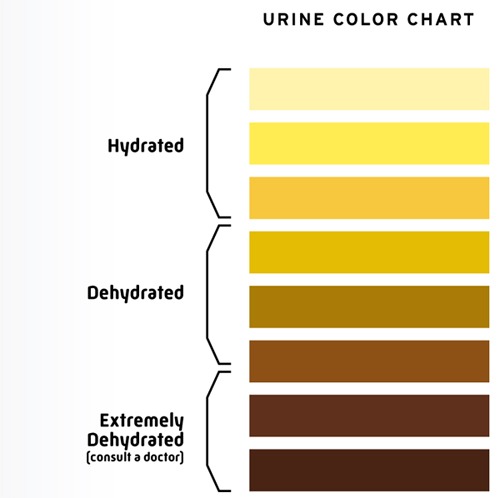Have you ever heard the rule, "You should be drinking eight 8-oz glasses of water a day?"
I certainly have...and while this is a good rule of thumb, hydration guidelines are highly individual. This makes it difficult to give people, especially people of different body sizes and activity levels, a set amount of water to drink every day.
 |
| Probably not drinking enough water for her sweaty run in the desert! |
Most people know they need to drink more water - a CDC survey discovered that many people were falling short of their hydration needs, some people not drinking ANY water at all.
You've probably heard that your body is made mostly of water, right? Water is essential for our cells to function! It helps our body get rid of waste, regulate temperature, helps our joints move smoothly and keeps your brain working correctly.
You've probably heard that your body is made mostly of water, right? Water is essential for our cells to function! It helps our body get rid of waste, regulate temperature, helps our joints move smoothly and keeps your brain working correctly.
DID YOU KNOW...
...most people don't FEEL THIRSTY until they are slightly dehydrated.
...being even slightly dehydrated can have an effect on your brain, heart, muscles and mood? Some people may experience headache symptoms, feel like they're in a bad mood, or feel like they can't focus.
Athletes are especially susceptible to dehydration because they lose sweat during their workouts and often aren't drinking enough to replenish this fluid loss. When we lose sweat, our blood volume goes down, reducing the amount of blood pumped with each heart beat, which can impair performance by reducing the amount of oxygen delivered to our muscles. The bottom line is that even 2-3% decrease in body weight can impair performance. This brings us back to the question -
How do we know if we're getting enough water?
Athletes often don't know that their performance is affected by hydration because they're always performing in a slightly dehydrated state. Because hydration is different for everyone, many health professions will refer to this "urine color chart" from the U.S. Anti-Doping Agency - if your urine is light yellow, you're probably drinking enough water.
 |
| U.S. Anti-Doping Agency |
What about coffee, tea and soda? Alcohol?
Unless you're drinking 7+ cups of coffee, caffeinated tea or caffeinated soda per day, your daily cup of caffeine isn't going to cause you to be dehydrated. Alcohol, on the other hand, has strong diuretic properties, making you urinate more often, which can lead to rapid dehydration. This can be detrimental to active people and athletes, so making sure to limit alcohol to 1-2 drinks and at least 1 to 2 cups of water between each drink can help you stay hydrated.
These 5 tips can help athletes and active people get and stay hydrated, feel better, and achieve optimal performance.
Grab your water bottle and fill it up.
The Sanford Power website has a Nutrition and Hydration for Team Sport Athletes page dedicated to this very topic!
Remember, everybody is different and you can be over hydrated. If you're running to the bathroom frequently or your urine is clear, you are likely drinking too much water, which can be just as harmful, if not more harmful to athletes than being dehydrated.
If you are an endurance athlete or exercising/practicing for several hours a day, you may want to consider adding an electrolyte replacement or sports drink to your routine to help you replenish the electrolytes you're losing in sweat. Some people might even try making their own sports drinks to help them stay hydrated.
----------------------------------------------------------------------------
What are your best tips for staying hydrated? Ask the dietitian your hydration questions!


No comments:
Post a Comment